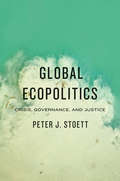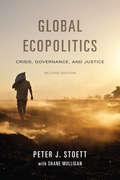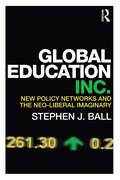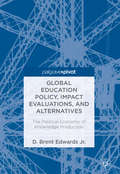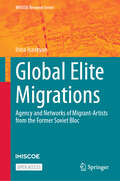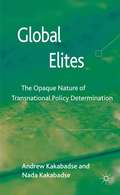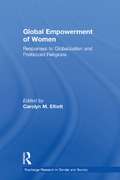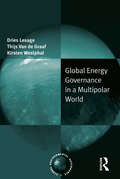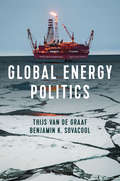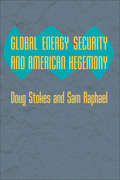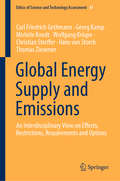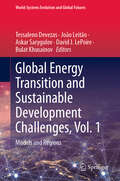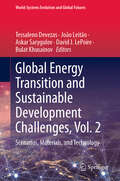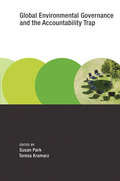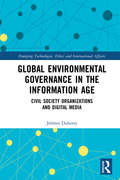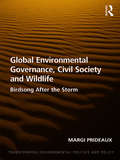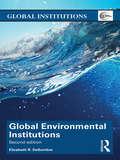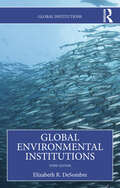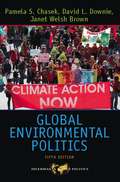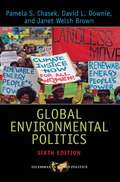- Table View
- List View
Global Ecopolitics: Crisis, Governance, And Justice
by Peter StoettDespite sporadic news coverage of extreme weather, international conventions on climate change, or special UN days, rarely do we participate in a sustained analysis of environmental policy making. To remedy this shortcoming and to propel the discussion forward, Peter J. Stoett provides a concise introduction to environmental governance. Through seven case studies, Stoett analyzes the ability of international policy to provide environmental protection and discusses the ever-present factors of equality, sovereignty, and human rights integral to these issues. While providing a panoramic view of the actors and structures producing these policies, Stoett reminds readers that the topic is personal, that responsible governance is not solely the charge of governments but of individuals and communities as well.
Global Ecopolitics: Crisis, Governance, and Justice, Second Edition
by Peter StoettDespite sporadic news coverage of extreme weather events, high-level climate change diplomacy, special UN days of celebration, and popular media references to impending ecological collapse, most students are not exposed to the detailed presentation and analysis of the international relations and diplomacy of environmental policy-making. Comprehensive and accessibly written for first-year or second-year undergraduates, the second edition of Global Ecopolitics provides students with a panoramic view of the policymakers and the structuring bodies involved in the creation of environmental policies. Detailing a considerable amount of environmental activity since its initial 2012 publication, this up-to-date second edition uses an applicable framework of systemic analysis and important case studies that push students to form their own conclusions about past efforts, present needs, and future directions.
Global Education Inc.: New Policy Networks and the Neoliberal Imaginary
by Stephen J. BallDo private and philanthropic solutions to the problems of education signal the end of state education in itswelfare form?Education policy is being reformed and re-worked on a global scale. Policies are flowing and converging to produce a singular vision ofbest practice based on the methods and tenets of theneo-liberal imaginary. Philanthro
Global Education Policy, Impact Evaluations, and Alternatives: The Political Economy of Knowledge Production
by D. Brent Edwards Jr.This book contributes to how we conceptualize and investigate the role and influence of knowledge production by international organizations within the field of global education reform. After elaborating on what it means to approach the intersection of these issues from a political economy perspective, the book develops a focus on knowledge production broadly to examine specifically the production of impact evaluations, which have come to be seen by many as the most credible form of policy-relevant knowledge. Moreover, it not only unpacks the methodological, technical, political, and organizational challenges in the production of impact evaluations, but also details an approach to critically understanding and examining the role that impact evaluations, once produced, play within the political economy of global education reform more generally. Finally, this book demonstrates the application of this approach in relation to a global education policy from El Salvador and reflects on the implications of this case for alternative ways forward, methodologically and otherwise.
Global Elite Migrations: Agency and Networks of Migrant-Artists from the Former Soviet Bloc (IMISCOE Research Series)
by Irina IsaakyanThis open access book explores the lives and careers of migrating artists with the purpose to understand how they make use of their migrant-networks and how this process interacts with decisions they make about immigration and career development. Situated at the crossroads of Migration Studies and Elite Studies, this interdisciplinary research is based on sixty interpretive biographic interviews with opera singers from the former Soviet bloc who work in various places across Europe and beyond. The book raises the question to what extent they exercise agency as migrants and professionals and to what extent they preserve their professional elitism on the transnational level. The case of these migrant-artists serves to illuminate the dynamics of a wider phenomenon - global elite migrations - which is compared with an intergalactic journey. Through this sociological metaphor, the book offers a new analytical framework to think about the “agency-network” nexus.
Global Elites
by Andrew Kakabadse Nada KakabadseExploring the nature, configuration and influence of global elites, this book examines the impact of elites on transnational policy development and strategically on corporations as board members of PLCs and international joint ventures. Overall, the book provides a balanced view of how our present day elites operate.
Global Empowerment of Women: Responses to Globalization and Politicized Religions (Routledge Research in Gender and Society #Vol. 15)
by Carolyn M. ElliottThe empowerment of women is a broadly endorsed strategy for solving a host of difficult problems, from child poverty to gender violence to international development. The seventeen international scholars in this multi-disciplinary volume offer thoughtful critiques of the notion of empowerment based on their studies in twenty countries in all regions of the world. The comparative introduction places concepts of empowerment in the context of models of the market and of community, showing how contradictions in these models as they are enacted on the ground provide both spaces and constraints for women. The chapters consider opportunities for women in the context of globalization, resurgent nationalism and politicized religion, cultures of masculinity, and the HIV/AIDS epidemic in Africa. They show how initiatives at national or global levels are transformed by local cultures and power structures, and demonstrate the fruitfulness of tensions between universal values of human rights and contextualized understandings. This landmark, multi-disciplinary collection of original studies by distinguished international feminist scholars will be an essential addition to the fields of Political Science, Women’s Studies, Economics, Sociology, International Development, and Environmental Studies.
Global Energy Governance in a Multipolar World (Global Environmental Governance)
by Dries Lesage Thijs Van GraafMultipolar governance permits a number of important states to have significantly more economic and political clout than others, but among them there is hardly any hierarchy. The new energy challenge, with its intricate socio-economic, ecological and international-political considerations, is a multi-dimensional, multi-level and multi-actor issue that requires a minimum of 'central' political steering, because neither the invisible hand of the market, nor unilateral or bilateral power politics are capable to bring about sustainable solutions. Global Energy Governance in a Multipolar World investigates the relationship between the emergence of a multipolar world order and the enormous challenges of global energy governance that the world is facing in the 21st century. It reflects on fundamental questions such as how the main consuming countries can avoid conflict over scarce resources, how they will cooperate to bring about open energy markets, energy conservation and efficiency, and how they can promote renewable energy sources.
Global Energy Politics (Energy, Climate And The Environment Ser.)
by Benjamin K. Sovacool Thijs Van de GraafEver since the Industrial Revolution energy has been a key driver of world politics. From the oil crises of the 1970s to today’s rapid expansion of renewable energy sources, every shift in global energy patterns has important repercussions for international relations. In this new book, Thijs Van de Graaf and Benjamin Sovacool uncover the intricate ways in which our energy systems have shaped global outcomes in four key areas of world politics: security, the economy, the environment and global justice. Moving beyond the narrow geopolitical focus that has dominated much of the discussion on global energy politics, they also deftly trace the connections between energy, environmental politics, and community activism.The authors argue that we are on the cusp of a global energy shift that promises to be no less transformative for the pursuit of wealth and power in world politics than the historical shifts from wood to coal and from coal to oil. This ongoing energy transformation will not only upend the global balance of power; it could also fundamentally transfer political authority away from the nation state, empowering citizens, regions and local communities. Global Energy Politics will be an essential resource for students of the social sciences grappling with the major energy issues of our times.
Global Energy Security and American Hegemony (Themes in Global Social Change)
by Doug Stokes Sam RaphaelThis analysis of the United States and energy security examines the close relationship between US military supremacy in oil-rich regions and America's maintenance of global power.Energy security generally evokes thoughts of American intervention in the Middle East to protect US interests in that region's oil-rich fields. Doug Stokes and Sam Raphael move beyond that framework to consider US actions in Latin America, Central Asia, and Africa. Drawing on State and Defense Department records and other primary sources and previous scholarship, they show how US foreign policy since World War II has sought to maintain a global energy security regime that supports the nation's allies while maintaining American hegemony. Stokes and Raphael explain how US intervention in energy-rich states insulates and stabilizes those nations' transnationally oriented actors and political economies and why American oil diversification strategy strengthens the country's position against rivals in the global capitalist system. They argue that counterinsurgency aid and other types of coercive US statecraft protect the recipient states from an array of potentially revolutionary armed and unarmed internal social forces, thereby securing the energy supplies of nations deemed strategically important to the United States or its allies. Clear and accessible, this cutting-edge contemporary policy analysis will engage scholars of US foreign policy and international relations as well as policymakers grappling with the importance of energy security in today's world.
Global Energy Supply and Emissions: An Interdisciplinary View on Effects, Restrictions, Requirements and Options (Ethics of Science and Technology Assessment #47)
by Wolfgang Kröger Thomas Ziesemer Georg Kamp Michèle Knodt Carl Friedrich Gethmann Christian Streffer Hans von StorchThis book offers an authoritative analysis of the state-of-the art in energy and climate research and policy. It starts by describing the current status of technologies that are expected to have an influence on the energy systems of the future. For an adequate evaluation, it presents the latest findings on the effects of energy supply and consumption as well as of the emissions on both the environment and people’s health. This is followed by an extensive discussion of the economic and social problems related to climate change, the need for energy transitions, and other issues that may require public investment and international agreements. The book reviews the problem of energy policy from a global perspective, providing readers with the technical, political, economic and ethical background needed to understand the current situation and work at better solutions for a sustainable, just and prospering world.
Global Energy Transition and Sustainable Development Challenges, Vol. 1: Models and Regions (World-Systems Evolution and Global Futures)
by João Leitão Tessaleno Devezas Askar Sarygulov David J. LePoire Bulat KhusainovThis two-volume book presents the challenges of the global energy transition, offering a comprehensive exploration of the policies and drivers shaping the pace and trajectory of this transformation. Highlighting regional development, the book shows how different models and scenarios of energy transition emerge. It discusses important factors, such as materials and technologies, shedding light on the opportunities and constraints for the energy transition. Global warming and climate change influenced the change in people’s consciousness and their awareness of the need for more limited use of hydrocarbon resources. Changes in weather conditions, rising sea levels, and destructive climate events such as hurricanes, forest fires, droughts, floods, etc. have become more frequent. Many countries around the world, reacting to these changes, have developed long-term plans to actively replace fossil fuels - gas, oil, and coal with renewable energy sources, mainly solar and wind. However, the low replacement rates observed in the global energy sector over the past 30 years raise the question of how far the decarbonization scenarios and models being implemented by many countries bring us closer to the ultimate goal of creating an economy with a low carbon footprint. Seeking answers, the volumes feature 22 chapters split across the two books, which in detail discuss various aspects of the energy transition and their impact on the sustainability of economic development and the future of energy. This first volume, "Models and Regions," focuses on regional disparities and economic drivers, presenting case studies from different regions in 10 chapters.
Global Energy Transition and Sustainable Development Challenges, Vol. 2: Scenarios, Materials, and Technology (World-Systems Evolution and Global Futures)
by João Leitão Tessaleno Devezas Askar Sarygulov David J. LePoire Bulat KhusainovThis two-volume book presents the challenges of the global energy transition, offering a comprehensive exploration of the policies and drivers shaping the pace and trajectory of this transformation. Highlighting regional development, the book shows how different models and scenarios of energy transition emerge. It discusses important factors, such as materials and technologies, shedding light on the opportunities and constraints for the energy transition. Global warming and climate change influenced the change in people’s consciousness and their awareness of the need for more limited use of hydrocarbon resources. Changes in weather conditions, rising sea levels, and destructive climate events such as hurricanes, forest fires, droughts, floods, etc. have become more frequent. Many countries around the world, reacting to these changes, have developed long-term plans to actively replace fossil fuels - gas, oil, and coal with renewable energy sources, mainly solar and wind. However, the low replacement rates observed in the global energy sector over the past 30 years raise the question of how far the decarbonization scenarios and models being implemented by many countries bring us closer to the ultimate goal of creating an economy with a low carbon footprint. Seeking answers, the volumes feature 22 chapters split across the two books, which in detail discuss various aspects of the energy transition and their impact on the sustainability of economic development and the future of energy. This second volume, "Scenarios, Materials, and Technology," explores mechanisms and technological drivers for a sustainable transition in 12 chapters, from local industries to national economies.
Global Entanglements of a Man Who Never Traveled: A Seventeenth-Century Chinese Christian and His Conflicted Worlds (Columbia Studies in International and Global History)
by Dominic SachsenmaierBorn into a low-level literati family in the port city of Ningbo, the seventeenth-century Chinese Christian convert Zhu Zongyuan likely never left his home province. Yet Zhu nonetheless led a remarkably globally connected life. His relations with the outside world, ranging from scholarly activities to involvement with globalizing Catholicism, put him in contact with a complex and contradictory set of foreign and domestic forces. In Global Entanglements of a Man Who Never Traveled, Dominic Sachsenmaier explores the mid-seventeenth-century world and the worldwide flows of ideas through the lens of Zhu‘s life, combining the local, regional, and global. Taking particular aspects of Zhu‘s multiple belongings as a starting point, Sachsenmaier analyzes the contexts that framed his worlds as he balanced a local life and his border-crossing faith. At the local level, the book pays attention to the intellectual, political, and social environments of late Ming and early Qing society, including Confucian learning and the Manchu conquest, questioning the role of ethnic and religious identities. At the global level, it considers how individuals like Zhu were situated within the history of organizations and power structures such as the Catholic Church and early modern empires amid larger transformations and encounters. A strikingly original work, this book is a major contribution to East Asian, transnational, and global history, with important implications for historical approaches and methodologies.
Global Entertainment Media: Between Cultural Imperialism and Cultural Globalization
by Tanner MirrleesA critical cultural materialist introduction to the study of global entertainment media. In Global Entertainment Media, Tanner Mirrlees undertakes an analysis of the ownership, production, distribution, marketing, exhibition and consumption of global films and television shows, with an eye to political economy and cultural studies. Among other topics, Mirrlees examines: Paradigms of global entertainment media such as cultural imperialism and cultural globalization. The business of entertainment media: the structure of capitalist culture/creative industries (financers, producers, distributors and exhibitors) and trends in the global political economy of entertainment media. The "governance" of global entertainment media: state and inter-state media and cultural policies and regulations that govern the production, distribution and exhibition of entertainment media and enable or impede its cross-border flow. The new international division of cultural labor (NICL): the cross-border production of entertainment by cultural workers in asymmetrically interdependent media capitals, and economic and cultural concerns surrounding runaway productions and co-productions. The economic motivations and textual design features of globally popular entertainment forms such as blockbuster event films, TV formats, glocalized lifestyle brands and synergistic media. The cross-cultural reception and effects of TV shows and films. The World Wide Web, digitization and convergence culture.
Global Environmental Governance and the Accountability Trap (Earth System Governance)
by Susan Park Teresa KramarzAn examination of whether accountability mechanisms in global environmental governance that focus on monitoring and enforcement necessarily lead to better governance and better environmental outcomes. The rapid development of global environmental governance has been accompanied by questions of accountability. Efforts to address what has been called “a culture of unaccountability” include greater transparency, public justification for governance decisions, and the establishment of monitoring and enforcement procedures. And yet, as this volume shows, these can lead to an “accountability trap”—a focus on accountability measures rather than improved environmental outcomes. Through analyses and case studies, the contributors consider how accountability is being used within global environmental governance and if the proliferation of accountability tools enables governance to better address global environmental deterioration. Examining public, private, voluntary, and hybrid types of global environmental governance, the volume shows that the different governance goals of the various actors shape the accompanying accountability processes. These goals—from serving constituents to reaping economic benefits—determine to whom and for what the actors must account. After laying out a theoretical framework for its analyses, the book addresses governance in the key areas of climate change, biodiversity, fisheries, and trade and global value chains. The contributors find that normative biases shape accountability processes, and they explore the potential of feedback mechanisms between institutions and accountability rules for enabling better governance and better environmental outcomes. Contributors Graeme Auld, Harro van Asselt, Cristina Balboa, Lieke Brouwer, Lorraine Elliott, Lars H. Gulbrandsen, Aarti Gupta, Teresa Kramarz, Susan Park, Philipp Pattberg, William H. Schaedla, Hamish van der Ven, Oscar Widerberg
Global Environmental Governance in the Information Age: Civil Society Organizations and Digital Media (Emerging Technologies, Ethics and International Affairs)
by Jérôme DuberryThis book examines the impact of current and emerging digital technologies on global environmental governance, and in particular on environmental civil society organizations. Technological innovations are constantly emerging: internet and social media platforms, blockchains, big data, and artificial intelligence are some of the most common or promising digital technologies of our times. Through case studies and the analysis of concrete applications of digital technologies, this book shows how these digital technologies can be deployed to support global environmental governance, and in particular a multi-stakeholder approach to the protection of the environment. It provides an overview of the diverse uses of these digital technologies by civil society organizations (CSOs) in global environmental governance. In this fast-changing context, the capacity of environmental CSOs to manage and benefit from digital technologies, and to produce and distribute information, can strengthen their participation in global environmental governance. Their key roles, including advocacy, monitoring, knowledge production, fundraising, nudging individual behaviors, and project implementation, greatly benefit from the use of these technologies. By examining some of the most-utilized current digital technologies and presenting some of the most prominent emerging ones, this book aims to illustrate how active civil society organizations operate, and how ICTs support some of their roles, and therefore their participation in global environmental governance. This book will appeal to scholars and students of environmental studies and politics, global governance, political sociology, geography and communication studies along with policy makers and communication specialists from the environmental community.
Global Environmental Governance, Civil Society and Wildlife: Birdsong After the Storm (Transforming Environmental Politics and Policy)
by Margi PrideauxThe world is entering a period of unprecedented environmental and political change. By mid-century, climate change will cause dramatic ecosystem shifts. Hundreds, if not thousands, of species will disappear from the earth including icons like polar bears, gorillas, Asiatic lions and bluefin tuna. For many cultures ’species’ are ’place’. As our cultivated global community erodes, international triage decisions about species and local ecosystems will commence and if we are not alert, these decisions will be made on our collective behalf, without local perspective or accountability. Global Environmental Governance, Civil Society and Wildlife illuminates a clear pathway for the environmental, non-governmental community to transition into a co-governance role. Many NGO diplomats have deeper experience and more technical knowledge about policy discussions than their government counterparts and are unburdened by sovereign constraints. The book puts forward the perspectives of developing world civil society and the case that it must play a more significant role in future decision making. Civil society from around the world must be welcomed by governments at the global environmental governance table if we are to hear birdsong after the storm.
Global Environmental Institutions (Global Institutions)
by Elizabeth R. DesombreThere has been a concurrent growth in interest in the institutions that deal with global environmental issues. A vast number of international organizations address these matters; this volume provides an overview of the major global institutions attempting to protect the natural environment. It first considers the United Nations Environment Programme and the other entities within the United Nations that play important roles in global environmental governance. It then examines institutions clustered by issue area, introducing institutions that focus on protecting endangered species and biodiversity, those that govern the ocean environment, those focusing on the atmosphere, and a recent set of institutions that regulate the transboundary movement of hazardous substances. It concludes with current debates on financing international environmental action, gaining widespread participation by states, and the question of whether the institutional structure of global environmental governance can, and should, be fundamentally reformed. The volume as a whole focuses on: the underlying causes of global environmental problems the creation of global environmental institutions the effectiveness of action undertaken by these institutions. Written by an acknowledged expert in the field, Global Environmental Institutions is essential reading for students of environmental politics and international organizations.
Global Environmental Institutions (ISSN)
by Elizabeth R. DeSombreGlobal Environmental Institutions provides the most accessible and succinct overview of the major global institutions attempting to protect the natural environment, describing their creation and operation, decision-making processes, interactions with other institutions, and impact. Fully updated throughout, this third edition maintains the clear structure of previous editions, examining the underlying causes of global environmental problems creation of global environmental institutions effectiveness of action undertaken by these institutions Providing an overview of the United Nations Environment Programme alongside other entities that play important roles in global environmental governance, this book examines institutions by issue area and introduces organizations with a specific focus on protecting endangered species and biodiversity, the atmosphere, the ocean environment, and regulating the transboundary movement of hazardous substances. Drawing on the latest scholarship, and written by an acknowledged expert in the field, this study is essential reading for students of environmental politics and international organizations.
Global Environmental Politics
by Pamela S. Chasek David L. Downie Janet Welsh BrownWhenGlobal Environmental Politicswas first published, the environment was just emerging as a pivotal issue in traditional international relations. Today, the environment is considered to be a central topic to discussions of international politics, political economy, international organization, and the relationship between foreign and domestic policy. With new and updated case studies throughout, a revised chapter on improving compliance with international environmental regimes, and a new section on environment within the larger context of sustainable development, this classic text is more complete and up-to-date than any survey of international environmental politics on the market. In addition to providing a concise yet comprehensive overview of global environmental issues, the authors have worked to contextualize key topics such as the 2002 World Summit on Sustainable Development, the Kyoto Protocol, the Stockholm Convention on Persistent Organic Pollutants, international forest policy, and the trade, development and environment nexus. Environmental concerns from global warming to biodiversity loss to whaling are seen as challenges to transnational relations, with governments, NGOs, IGOs, and MNCs all involved in the multilateral interaction that is necessary to address the ever-complicated subject of global environmental politics.
Global Environmental Politics
by Pamela S. Chasek David L. Downie Janet Welsh BrownAlthough discussions about the global environment are now a daily occurrence--from companies touting energy-saving products to politicians debating how to best address the issue of climate change and other environmental concerns--it remains a topic plagued by misinformation and ideologically skewed arguments. For more than twenty years, Global Environmental Politics has provided an up-to-date, accurate, and unbiased introduction to the world's most pressing environmental issues, and this new edition continues the tradition. With new material on the latest international environmental regimes, the 2012 UN Conference on Sustainable Development, the challenges of regime implementation, and the impact of the global economic crises on the global environment, the authors offer a comprehensive overview of the environment and international politics. It is vital reading for anyone wishing to understand the current state of the field and to make informed decisions about which policies might best safeguard our environment for the future.
Global Environmental Politics
by Pamela S. Chasek David L. Downie Janet Welsh BrownAlthough discussions about the global environment are now a daily occurrence-from companies touting energy-saving products to politicians debating how to best address the issue of climate change and other environmental concerns-it remains a topic plagued by misinformation and ideologically skewed arguments. For nearly twenty years, Global Environmental Politics has provided an up-to-date, accurate, and unbiased introduction to the world's most pressing environmental issues, and the fifth edition continues this tradition. Offering a comprehensive yet concise overview of the environment and international politics, this updated edition includes new material on the latest international environmental regimes, climate change, the environmental challenges of free trade and globalization, and the growing role of the environment in global security. It is vital reading for anyone wishing to understand the current state of the field and to make informed decisions about which policies might best safeguard our environment for the future.
Global Environmental Politics
by Pamela S. Chasek David L. Downie Janet Welsh BrownAlthough discussions about the global environment are now a daily occurrence--from companies touting energy-saving products to politicians debating how to best address the issue of climate change and other environmental concerns--it remains a topic plagued by misinformation and ideologically skewed arguments. For more than twenty years, Global Environmental Politics has provided an up-to-date, accurate, and unbiased introduction to the world’s most pressing environmental issues, and this new edition continues the tradition. With new material on the latest international environmental regimes, the 2012 UN Conference on Sustainable Development, the challenges of regime implementation, and the impact of the global economic crises on the global environment, the authors offer a comprehensive overview of the environment and international politics. It is vital reading for anyone wishing to understand the current state of the field and to make informed decisions about which policies might best safeguard our environment for the future.
Global Environmental Politics
by Pamela S. Chasek David L. Downie Janet Welsh BrownWhen Global Environmental Politics was first published, the environment was just emerging as a pivotal issue in traditional international relations. Today, the environment is considered to be a central topic to discussions of international politics, political economy, international organization, and the relationship between foreign and domestic policy. With new and updated case studies throughout, a revised chapter on improving compliance with international environmental regimes, and a new section on environment within the larger context of sustainable development, this classic text is more complete and up-to-date than any survey of international environmental politics on the market. In addition to providing a concise yet comprehensive overview of global environmental issues, the authors have worked to contextualize key topics such as the 2002 World Summit on Sustainable Development, the Kyoto Protocol, the Stockholm Convention on Persistent Organic Pollutants, international forest policy, and the trade, development and environment nexus. Environmental concerns from global warming to biodiversity loss to whaling are seen as challenges to transnational relations, with governments, NGOs, IGOs, and MNCs all involved in the multilateral interaction that is necessary to address the ever-complicated subject of global environmental politics.
